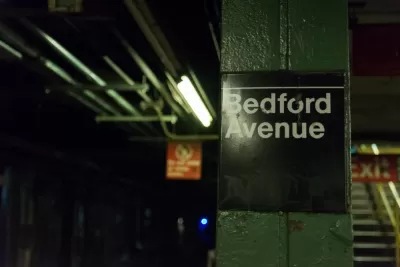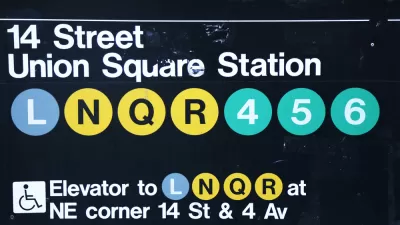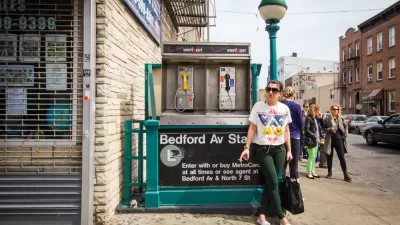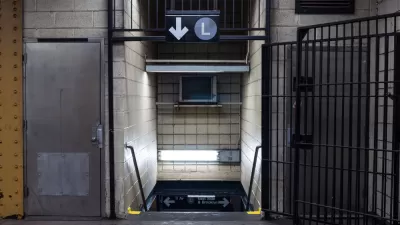The long awaited repair work on the L Train between Brooklyn and Manhattan launched over the weekend.

Ali Watkins and Edgar Sandoval report from the first weekend of a partial shutdown on the L Train on the New York MTA subway system.
"The crowds? Large, but not mutinous. The annoyance levels during the inaugural weekend of the L train slowdown? Present, but predictable."
The MTA is running significantly fewer trains on the L line on nights and weekend for the next 15 to 18 months to make repairs to damage caused by Hurricane Sandy. The partial shutdown is the work of Gov. Andrew Cuomo, who intervened at the 11the hour in a plan to shut down the line completely.
Now the long-awaited repair work has begun, and Watkins and Sandoval report that it all could have gone a lot worse on the first weekend. "Despite doomsday predictions of long turnstile lines, closed station entrances and dangerously crowded platforms, the L train’s first rehab weekend went as well as the Metropolitan Transportation Authority could have hoped."
At the time of their writing, the return to regular schedules for Monday rush hour was an open question, but Stephen Nessen and Jake Offenhartz picked up where Watkins and Sandoval left off.
"On Monday at 5 a.m, L train service was supposed to return to normal after the first weekend of construction, just in time for the morning rush hour. And it did—for an hour. Then at 6 a.m. an L train with mechanical issues caused delays that rippled to Bedford Avenue, where headways jumped from 9 minutes to 24 minutes."
Still, by 6:40 am, the trains were running on schedule again. New York City Transit President Andy Byford was on hand at the Bedford Avenue and was pleased with what he saw, according to the article. Nessen and Offenhartz offer their own assessment of the weekend slowdown too, and paint a slightly less rosy picture.
FULL STORY: L Train Slowdown: First Weekend Disruption Is Frustrating, but Not Disastrous

Alabama: Trump Terminates Settlements for Black Communities Harmed By Raw Sewage
Trump deemed the landmark civil rights agreement “illegal DEI and environmental justice policy.”

Study: Maui’s Plan to Convert Vacation Rentals to Long-Term Housing Could Cause Nearly $1 Billion Economic Loss
The plan would reduce visitor accommodation by 25% resulting in 1,900 jobs lost.

Planetizen Federal Action Tracker
A weekly monitor of how Trump’s orders and actions are impacting planners and planning in America.

Waymo Gets Permission to Map SF’s Market Street
If allowed to operate on the traffic-restricted street, Waymo’s autonomous taxis would have a leg up over ride-hailing competitors — and counter the city’s efforts to grow bike and pedestrian on the thoroughfare.

Parklet Symposium Highlights the Success of Shared Spaces
Parklets got a boost during the Covid-19 pandemic, when the concept was translated to outdoor dining programs that offered restaurants a lifeline during the shutdown.

Federal Homelessness Agency Places Entire Staff on Leave
The U.S. Interagency Council on Homelessness is the only federal agency dedicated to preventing and ending homelessness.
Urban Design for Planners 1: Software Tools
This six-course series explores essential urban design concepts using open source software and equips planners with the tools they need to participate fully in the urban design process.
Planning for Universal Design
Learn the tools for implementing Universal Design in planning regulations.
Caltrans
Smith Gee Studio
Institute for Housing and Urban Development Studies (IHS)
City of Grandview
Harvard GSD Executive Education
Toledo-Lucas County Plan Commissions
Salt Lake City
NYU Wagner Graduate School of Public Service





























